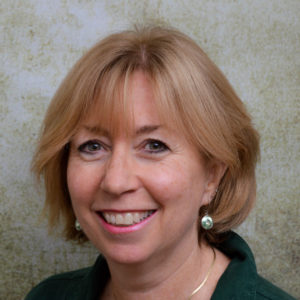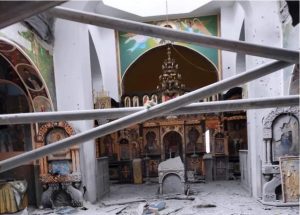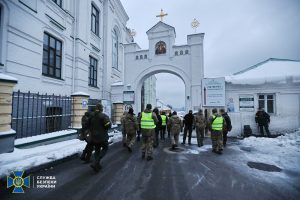
Catherine Wanner is a professor of History and Anthropology at The Pennsylvania State University.
As the anniversary of the Russian full-scale invasion of Ukraine is commemorated, there are many reasons why Ukrainians insist that global support must not waiver for Ukrainian forces and their fight to secure Ukrainian sovereignty. Russian leaders have demonstrated that they believe their possession of nuclear arms translates into an ability to exercise imperial ambitions by violating international law with impunity. Russia watchers the world over have long connected the annexation of the Crimean Peninsula and the inciting of an armed separatist movement in eastern Ukraine in 2014 with the 1990–92 manufactured “frozen conflict” in Transdniestria, Moldova, which borders western Ukraine, and the Russian seizure of 20 percent of Georgian territory in Abkhazia and South Ossetia in 2008. In each instance, similar tactics were deployed to destabilize a neighboring former Soviet republic to expand Russian domination in the region. Analogous forms of brutal Russian aggression to those we have witnessed for one year in Ukraine were preceded by wanton destruction of civilian populations and civilian infrastructure in the Russian republic of Chechnya in 1992 and 1995 and in Syria beginning in 2015 against opponents of the vicious regime of Bashar al-Assad.
Cell phones and the internet in the hands of a technologically sophisticated population have resulted in the most highly documented war ever. Since February 2022, a mountain of purported evidence of war crimes, crimes of aggression, and human rights violations continues to rise. This prompts an urgent question: what means are Ukrainians willing to use to defeat Russia’s mission to recolonize them? Russian efforts to compromise Ukrainian sovereignty have taken many innovative forms, including the weaponization of religion. Should one respond in kind? This has rendered religion, usually considered a form of soft power for the influence it wields, a very hard and effective weapon to be wielded in multiple directions by numerous parties. The weaponization of religion has reanimated a saying that was frequently heard in the aftermath of the USSR’s collapse: For my friends, everything; for my enemies, the law.
The temptation to use the law to weaponize religion, to recalibrate the status of certain denominations to greater advantage and greater disadvantage for others, is risky. It could exacerbate and deepen social tensions and entrench conflict in Ukrainian society, even long after this war ends. Religion is not the primary factor driving this armed conflict, but it has outsized and unconventional importance. The potential of religious actors to sway the intensity and longevity of the conflict is significant. Religious organizations influence the formation of war narratives, the interpretation of the sources of conflict within local communities, and the types of political and legal processes that are unleashed to respond to them.
Nearly all religious groups in Ukraine have broken relations with their co-believers in Russia, creating something of a parallel proxy war among religious institutions that mirrors the war on the battlefield. Outrage over the invasion, the vast disappointment over the Russian public’s support for expanded armed combat, and the related issues born of this grief and anger prompted a roster of Protestant, Jewish, Muslim, Buddhist, and even New Age groups in Ukraine to break their unions and halt cooperative endeavors with co-religionists in Russia. The challenge is greatest of all for Orthodox believers and clergy.
In 2019, five years into the hybrid war in eastern Ukraine, in response to Ukrainian requests for a separate, self-governing church independent from Moscow, the Ecumenical Patriarch in Constantinople, the first among equal leaders in global Orthodoxy, granted a tomos of autocephaly. This allowed for the creation of an independent Orthodox Church of Ukraine. This monumental act set in motion a recalibration of alliances, not just within Ukrainian Orthodox parishes, but within global Orthodoxy as well. The previously existing Ukrainian Orthodox Church of the Moscow Patriarchate (UOC-MP) is a local Ukrainian church that recognizes the authority of the leader of the Russian Orthodox Church (ROC), Patriarch Kirill. Patriarch Kirill is a vigorous supporter of the war effort even though the majority of the more than 400 religious buildings that have been destroyed since the invasion are part of the UOC-MP and the majority of civilian war causalities are in regions where the UOC-MP predominates. This untenable situation made the creation of an alternative church urgent.

These shifts in the religious landscape resulted in perceptions of a polarized choice between a national church and one subservient to Moscow. The starkness of diametrically opposed choices was ignited by the ROC concept of the Russian World (Russkiy Mir). The Russian World posits that Ukraine, Russia, and Belarus constitute an organic, single civilizational and spiritual space under the umbrella leadership of the Moscow Patriarch. Evocation of the baptism of Kyivan Rus’ in 988 as the cradle of Russian civilization became a means to legitimize the Russian World as a political and ecclesiastical governing concept. It also provided a justification for invasion, which the leadership of the ROC continues to endorse. For these and other reasons, the tide of popular opinion has turned sharply against the ROC in Ukraine and to a lesser extent against the UOC-MP as well. The growing pressures of war are fracturing the UOC-MP union with the ROC and inspiring new uses of the law to deal with “enemies.”
Recent surveys put the number of Eastern Christian believers in Ukraine at around three-quarters of the population. Prior to the war, in terms of number of parishes, the UOC-MP was the largest. Since the full-scale invasion began, the percentage of the population that claims to be affiliated with the UOC-MP has fallen as low as four percent, although the total percentage of believers in the country has risen. The full ramifications of these changes on the religious landscape will only emerge over the coming years, if not decades.
In the short-term, against the backdrop of war, believers, parish priests, clergy, and government officials alike all struggle to redefine their relationships to Russia and Russians. Two related trends are developing. First, one year of war has resulted in strong national consolidation and increased national solidarity. Trust in religious institutions remains high in Ukraine at 61.1 percent. However, a growing sector of the population is beginning to question that trust. A survey from November 2022 documented that the percentage of respondents who are not sure if they trust the Church has doubled in the past year to 19.9 percent, which most likely reflects growing suspicion of the UOC-MP. Another survey conducted one month later in December 2022 compares levels of trust in social institutions over time. Although trust in religious institutions remains steady, it has been far outpaced by dramatically rising levels of trust in various government offices and institutions, including the President, the police, and even the Security Services. Trust in the Armed Forces and volunteers has topped the list since the outbreak of armed combat in eastern Ukraine in 2014. According to the Kyiv International Institute of Sociology survey, after almost one year of war the Church fell to tenth place in terms of popular trust. In other words, during this period of mass mobilization since the invasion began, trust in a multitude of social groups, including IDPs, and government bodies rose sharply. Trust in religious institutions, by remaining stable, has not kept pace and has been outstripped by public institutions, some of which were previously held in great disdain.
One reason why assessments of the trustworthiness of religious institutions have not kept up with other institutions is that suspicions turned to charges levied against some clergy of the UOC-MP for various forms of collaboration with Russian forces. The Kyiv Pechersk Lavra, which is under the auspices of the UOC-MP and one of the three most important monasteries for all Eastern Christians, was raided by Ukrainian state authorities in November 2022. State officials feared the monastery served as a base for “subversive activities.” As a result, in late December 2022, by presidential decree, 13 members of the UOC-MP clergy had their Ukrainian citizenship revoked.

We know from the attempts of various Eastern European countries after 1989 how very difficult it is to operationalize a legal definition of collaboration. Most notably in the former German Democratic Republic and former Czechoslovakia, political officials tried to identify who had been a collaborator with the secret police so as to purge them from the post-1989 ruling elite. In many instances, accusations were made, due process was suspended, and lives and careers were ruined in the swirl of emotion and argumentation, although relatively few charges were ever brought. [1]
In a similar vein, bypassing the criminal code for violations of the law in favor of more political and expedient charges of collaboration is short-sighted and might actually introduce confusion. What exactly constitutes collaboration with Russian forces? Is a member of the clergy who distributes humanitarian aid received from Russia a collaborator? If a Ukrainian member of the clergy agrees to reregister his community after having been threatened with personal physical harm or physical harm to his family, is this person a collaborator? These scenarios are not exceptional. Addressing reactions to such situations in terms of collaboration, rather than criminal offense according to a criminal code of law, potentially sows the seeds for a miscarriage of justice. It does little to strengthen the overall rule of law in Ukraine and advance its standing as a candidate for admittance into the European Union. The UOC-MP is now a minority religious group—and even an unwanted one in some quarters—much like the Ukrainian Greek Catholic Church, Roman Catholic Church, and Protestants have been in the past, depending on the regime. Therefore, how the UOC-MP is treated could set a precedent for the fate of other minority religious groups. It is imperative that the Ukrainian state proceed judiciously, a difficult request in a wartime crisis where the bell tolls loudly.
Does this mean that religious freedom is under threat in Ukraine? It doesn’t have to be. It depends on how decisions are made at this critical juncture. Religious organizations have long been used to further political aims, and political aims inform the actions of religious institutions. This instrumentalization of religious organizations has repeatedly tarnished public trust in religious institutions. In the heat of a year-long, punishing war that promises to continue unrelentingly, it is very tempting for leaders in Ukraine to react emotionally and politically for short-term advantage by using the law to bludgeon enemies. As soft power, along with everything else, is weaponized, the importance of making strategic, not reactive, decisions grows each day. Although it seems interminable, this war will someday end. It is imperative to resist using the law against enemies in the short-term to fortify Ukrainian sovereignty lest the seeds of prolonged conflict among Ukrainians be sown through inter- and intra-religious disputes.
[1] Tina Rosenberg, The Haunted Land: Facing Europe’s Ghosts after Communism (1995).
